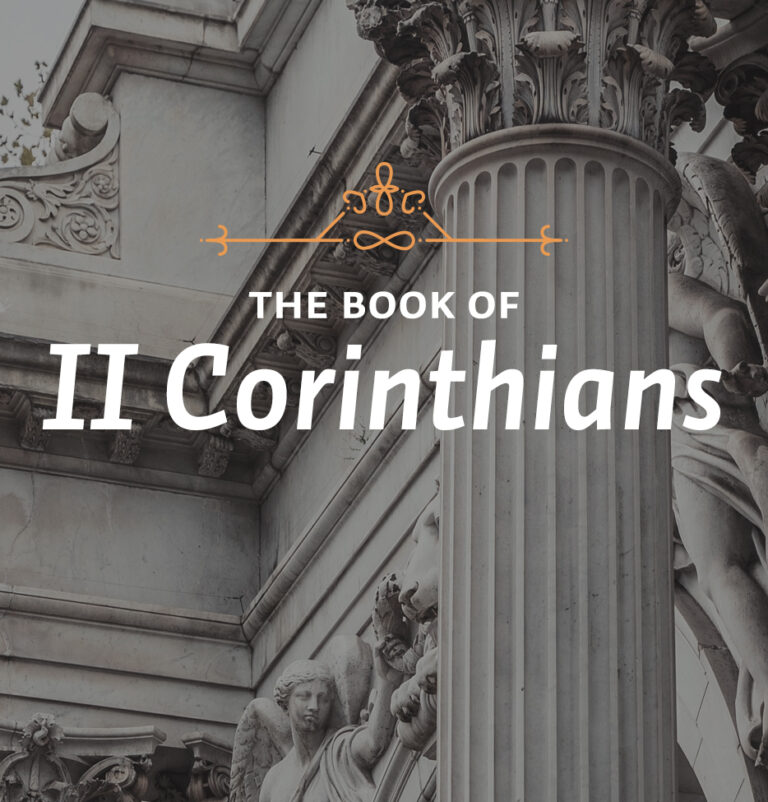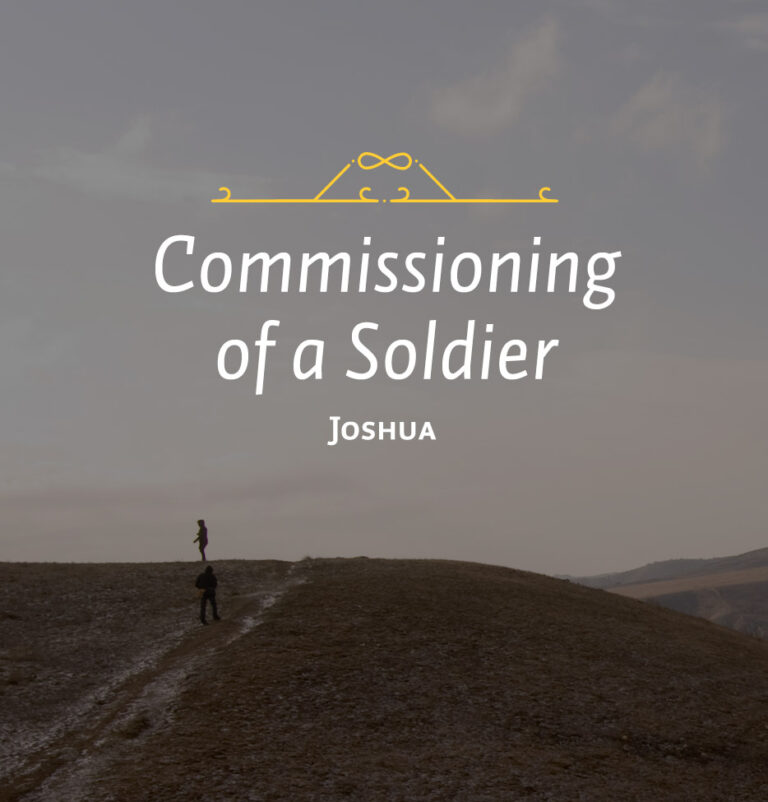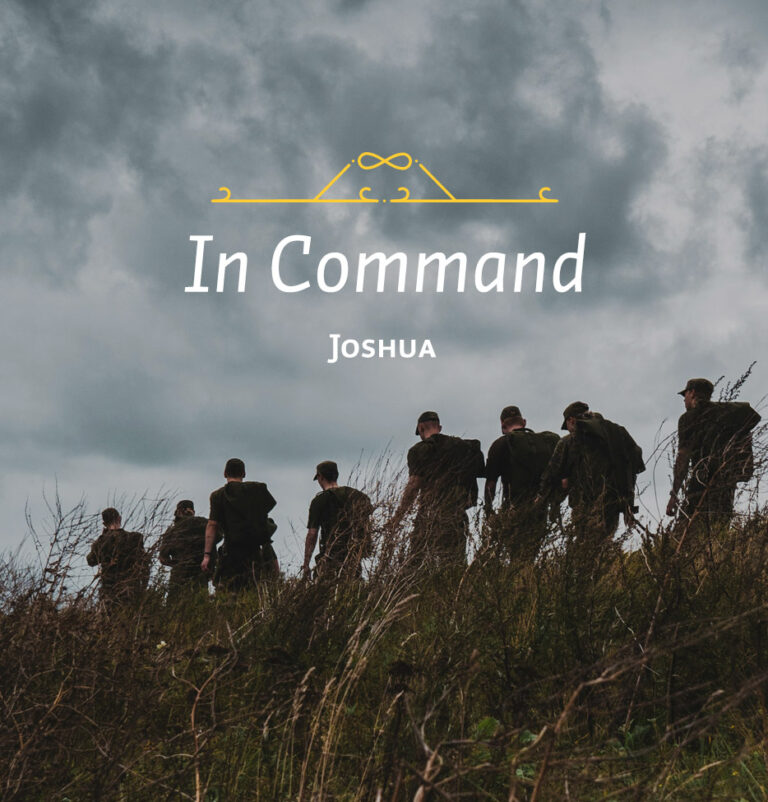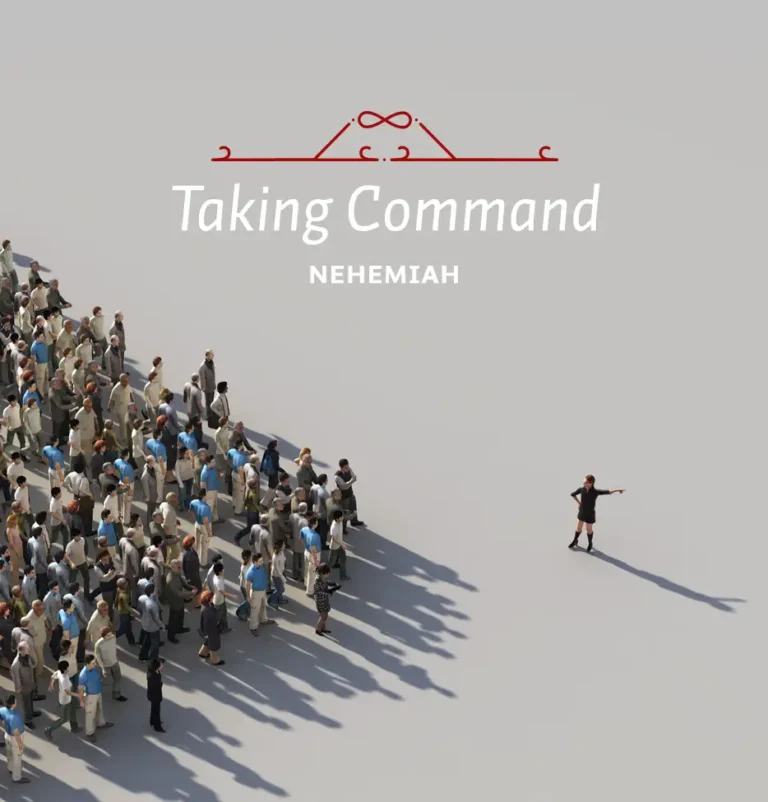
Paul, the Bold — Part Two
Paul, the Bold2 Corinthians 10:1-18Theme: Strength under pressure.This week’s lessons teach us how to handle criticism in a God-honoring way.
Lesson

Paul, the Bold2 Corinthians 10:1-18Theme: Strength under pressure.This week’s lessons teach us how to handle criticism in a God-honoring way.
Lesson

Paul, the Bold2 Corinthians 10:1-18Theme: Strength under pressure.This week’s lessons teach us how to handle criticism in a God-honoring way.
Lesson

Paul, the Bold2 Corinthians 10:1-18Theme: Strength under pressure.This week’s lessons teach us how to handle criticism in a God-honoring way.
Lesson

Paul, the Bold2 Corinthians 10:1-18Theme: Strength under pressure.This week’s lessons teach us how to handle criticism in a God-honoring way.
Lesson

Theme: The Example of Christ
In this week’s study, we look at the office of elder and deacon, and note the importance of Christian leadership, both in the church and in other callings we have received from God.
Scripture: 1 Timothy 3:1-13

Theme: Christian Leaders
In this week’s study, we look at the office of elder and deacon, and note the importance of Christian leadership, both in the church and in other callings we have received from God.
Scripture: 1 Timothy 3:1-13

Theme: Servant Leadership
In this week’s study, we look at the office of elder and deacon, and note the importance of Christian leadership, both in the church and in other callings we have received from God.
Scripture: 1 Timothy 3:1-13

Theme: The Need for Deacons
In this week’s study, we look at the office of elder and deacon, and note the importance of Christian leadership, both in the church and in other callings we have received from God.
Scripture: 1 Timothy 3:1-13

Theme: The Office of Elder
In this week’s study, we look at the office of elder and deacon, and note the importance of Christian leadership, both in the church and in other callings we have received from God.
Scripture: 1 Timothy 3:1-13

Leadership involves loneliness. The leader walks alone. The task of a leader is to set the vision, plan and motivate. By the very nature of the task, the leader is doing that more or less by himself. Sometimes it’s done with a team, of course, but not with the support or understanding of the masses of the people. Once you set a vision, it has to be communicated, and initially it’s not always shared. The plan, too, is so often misunderstood. And motivations are resisted. Yet the leader has to carry on.

These two old men have a great deal to share. Moses begins to rehearse to him all of the things that God had done on behalf of the people. Moses told of traveling to Egypt, meeting with the elders, and encountering Pharaoh, who rejected God’s demands. Moses told of the plagues and their significance. And then there was the night of the Passover, as the angel of death came through the land and killed all the firstborn of Egypt. After that, Moses recounted how Israel left in a hurry, and God saw them across the Red Sea and protected them in the desert, including delivering them from the Amalekites in that first great battle. In response, Jethro begins to praise God (vv. 10-11).

As I said, the heart of this chapter concerns the need for help in judging. The day after Jethro’s arrival, Moses went out to judge the people. They began to come to him early in the morning, and Moses made these judgments from morning until late at night. That’s not at all surprising, given that there are two million people. You can easily imagine that they got in one another’s way from time to time. Somebody’s sheep wandered over into the other man’s pen, and the first man wanted it back and the other one thought that it was his sheep all along. And there were probably things far worse than that. Moses was absolutely worn out from this task.

Moses was an extraordinary man. He had magnificent gifts and unbelievable training, the best possible training you could have in that day. But you see, even Moses couldn’t do everything. This is why you get the division of leadership. If he couldn’t do it, we can’t do it either. And we should be looking for people who can.

The second principle is very much like the first. Not only do you need a division of authority, but you also need a plurality of leadership. You find this in the New Testament. When Christ appointed apostles, He appointed twelve. And then when the early church appointed deacons, there were seven of them. When Paul traveled around the Roman world and established churches, he always left elders in charge, never just one. In my denomination we can’t have a self-governing church until we have at least two elders. There is wisdom in having more than one elder.

To anybody who has an interest in Paul as a person, the twentieth chapter of Acts is a delight. This is because we see him in two different but very important lights. We see him in public at Troas, leading the worship of the church. Then we see him in a private setting, meeting with the Ephesian elders at Miletus, a little town about twenty or thirty miles south of the Asian capital. The section is known as “Paul’s farewell to the Ephesian elders,” and it has three parts. The first concerns Paul himself. It contains Paul’s personal testimony before the elders. The second part is his specific charge to them. Finally, at the very end of the chapter and in much briefer language, we have a reference to his prayer on their behalf.

The second thing Paul says about himself in his testimony before the Ephesian elders is that, as he served among them with humility, he also did so with tears. Paul mentions this twice in the chapter. It is in verse 19, but you also find it in verse 31: “Remember that for three years I never stopped warning each of you night and day with tears.” Obviously this was something of considerable importance to him, though, as far as I know, this too is not referred to elsewhere.

Not only did Paul minister humbly and with tears, and not only was he diligent in his preaching, but he also had a proper set of priorities (v. 24). He told the elders, “I consider my life worth nothing to me, if only I may finish the race and complete the task the Lord Jesus has given me—the task of testifying to the gospel of God’s grace.”

The second part of Acts 20:13-38 is Paul’s charge to the elders. It is in verses 25-31. He puts it in different ways, but when we analyze what he is saying it boils down to one thing: “Keep watch over the flock within your charge.” He says, “Be diligent,” “Watch out for enemies,” “Take heed of wolves.” But basically he is telling them: “Keep watch over yourselves and all the flock of which the Holy Spirit has made you overseers” (v. 28).

How do you conclude a study like this, a farewell in which the Apostle Paul gave his personal testimony, charged those he was leaving behind, and prayed for them? I think there is a suggestion of a way to conclude in verse 32, where Paul speaks of “an inheritance” that God has prepared for His people.

Here we come to Joshua. And we find that this book is named after its chief character, and so it falls in a category of such other books as Ruth, First and Second Samuel, Ezra, Nehemiah, Esther, and the book of Job. Now, it’s appropriate that this book should be named Joshua because, although it deals with other things, it most certainly introduces us to the character and accomplishments of this really extraordinary man. Joshua, as I say, deals with other things. But here is a character who excelled in his obedience to God and led the people of Israel during a difficult and transitional period.

Yesterday we mentioned that Francis Schaeffer called Joshua “a bridge book.” That leads me to say that as I have studied a large number of the commentaries that deal with the book of Joshua, I’ve detected three basic approaches to this book.

This first section of Joshua 1 that we’re particularly considering in this study, Joshua 1:1-9, is divided into two paragraphs. The first paragraph indicates the transitional nature of the book. It’s what identifies it as a bridge, “After the death of Moses, the Lord said to Joshua…” The second paragraph in this first portion of Joshua 1 deals with the Word of God. And it deals with it in such a way that we recognize at once at the very beginning of the book that this is to be the focus of Joshua’s life and the life of the people.

Now, it’s worth reflecting on the specific things that Joshua was told to do so far as this law is concerned. There are four of them. First of all, he was to know God’s Word.

Yesterday we looked at the first two elements of Joshua’s commission. Today we look at the last two, and also conclude our study of Joshua 1:1-9.

There are two main sections to the first chapter of Joshua. The first part, in verses 1 through 9, contains an account of Joshua’s commissioning by God. The second part, verses 10-18, tells us how Joshua assumed command of the people and began to make preparations for the invasion of the Promised Land.

The third thing that is impressive about the early life in the faithful past of Joshua concerns the earlier incident where Moses sent the spies into the Promised Land.

Secondly, Joshua received a specific call, which we find in Joshua 1. Now when we talk about a call, we have to say that there is a sense in which all of us at all times as Christians have a general call. None of us is left to do nothing. We are all called to be disciples of Jesus Christ.
We’re all called to do good works. That’s just part of what it means to be a Christian. But that’s not what I’m talking about here when I’m talking about a call to leadership. I’m talking about a call to something specific—that is, to a task that a particular individual is given to do.

There’s a third thing I want to mention, and that is that a person who would be a leader must know, and have, and study, and meditate upon God’s objective revelation. It’s important to say that because that subjective and specific call must always be evaluated by, and at times, corrected by, the objective Word of God.

The final thing I want to say is that Christian leaders must also demonstrate genuine faith in God. Joshua was preeminently a man of faith. God told Joshua, “This is the land and I’m going to give it to you.” Joshua believed God, so when he went into the land with the other spies and searched it out, he didn’t care if there were giants. It didn’t bother him that there were walled cities.

In the middle of Joshua 10 there’s an interesting change in the nature of the narrative that describes the Israelite conquest of Canaan. Up to this point in the story, there have only been three real battles. There was the attack on Jericho and the destruction of that city; the attack on Ai and its destruction; and then there was the battle at Gibeon that began outside the walls of the city and continued southward as the Jewish armies pursued the retreating armies of the southern coalition. And all of that’s been given in considerable detail.

The routed armies were led by five kings. These five kings were apparently together directing the military operations. And when they saw the battle go against them and recognized that they were in great personal danger themselves, they hid in the cave near the town of Makkedah. And they went in to hide, thinking that in the battle the rush of the troops would pass by. Then after they had passed, the kings could emerge and make their way back to the city. They could regroup their fortresses and prepare to fight another day.

I think this is a good point to look back over this campaign and its details and see what it teaches us about the characteristics of strong leadership, which Joshua showed. There probably are other things that can be said about Joshua on the basis of other texts. But just looking at this one campaign, I see at least six things that are worth mentioning and trying to apply to ourselves.

Growing in the Christian life is no mystery. Christians have known what it is in all ages. It’s studying the Word of God. It’s praying. It’s fellowshipping with Christian people. It’s worshipping. It’s working for God. It’s witnessing. It’s testifying. Those are the things through which you grow. And then in response to these things, people say that it takes a long time, and that it’s difficult to read the Bible regularly. There are so many interruptions. That’s right, of course. Nobody ever said it was easy, but that’s the way it’s done.

This leads to the fifth characteristic, which is that Joshua obeyed the Lord completely. This was the most striking of his characteristics. If you go back to the very beginning of the book, you’ll recognize that in the first words of God to him, this is what he was encouraged to do: “Be careful to obey all the law my servant gave you. Do not turn from it to the right or to the left so that you may be successful wherever you go. Be careful to do everything.” Later on we are told, in 11:15, “As the Lord commanded His servant, Moses, so Moses commanded Joshua. And Joshua did it. He left nothing undone of all that the Lord commanded Moses. He obeyed the Lord completely.”

Many people whose stories are told to us in the Bible were leaders. We usually think of the Bible as a book concerned only with the common man, or with the lowly or disadvantaged, and it is true that it is. But that is only part of the story. For one thing, many of these “lowly” or “disadvantaged” people became leaders nevertheless. The New Testament apostles are examples. Besides, there are the recognized giants like Abraham, Moses, Joshua and David, who were leaders all the way. Much of the biblical story is about these outstanding people.

In yesterday’s study, we concluded by saying that we needed to understand something of the history of this period. Today we look at some of the key elements.

We are going to be looking at Nehemiah’s mastery of prayer more than once in these studies, but there is no better way to be introduced to it than by a study of the prayer with which the book starts. Here are three important things about it.

Nehemiah has reminded himself of what he is doing and the greatness and character of the God to whom he is directing his prayer. The second element in Nehemiah’s prayer is confession of sin. “I confess the sins we Israelites, including myself and my father’s house, have committed against you. We have acted very wickedly toward you. We have not obeyed the commands, decrees and laws you gave your servant Moses” (vv. 6-7).

The final element in the ACTS acrostic is supplication, which Nehemiah employs as a conclusion to his prayer (v. 11). Having acknowledged God’s greatness, confessed his own sin and reviewed God’s promises, he now lays his petitions before God, saying: “O Lord, let your ear be attentive to the prayer of this your servant and to the prayer of your servants who delight in revering your name. Give your servant success today by granting him favor in the presence of this man” (v. 11). “This man” was King Artaxerxes whom Nehemiah introduces in the next verse, the first of chapter 2. He recognizes that the king is the key to the plan he is already developing and that God is the key to changing the king’s heart.

We saw in the last chapter that the first dynamic of effective leadership illustrated in the memoirs of Nehemiah is the relationship between the leader and God. Unless his or her relationship to God is right the leader will never be God’s choice for any situation, nor in the final analysis will the leader ever be effective. Still it is not only to a heavenly superior that leaders must relate. They must also relate to earthly ones, and for this reason the second dynamic for any true leader involves what we generally refer to as the role of middle management.

Nehemiah’s difficulties did not stop there either. To be sad in King Artaxerxes presence was dangerous enough. But in addition to that, what Nehemiah wanted was to go to Jerusalem and rebuild its walls, and it was precisely this king who earlier had been petitioned against the rebuilding of the walls and had stopped the work as a result. Nehemiah’s plan meant asking him to reverse his own former policy.

The second secret of dealing with a superior successfully is tact. We speak about tact often. Yet more often we fail to exercise it. We think that it is more needful to “speak our mind,” Notice how tactful Nehemiah was with Artaxerxes.

The fourth secret of middle management success is prayer. We have already looked at Nehemiah’s great model prayer in chapter 1, noting that it had the elements of a formal petition: adoration, confession, thanksgiving and supplication. It gives insight into Nehemiah’s habits of personal devotion. Here we see something else. Nehemiah is talking to the king. The king asks what he wants. He realizes that after months of prayer the decisive moment has arrived. He is ready to speak. But before he speaks he utters a quick additional prayer “to the God of heaven” (v. 4).

The final secret of successful middle management in this story is dependence upon God. Nehemiah had been planning. Dependence on God does not eliminate planning any more than it eliminates hard work. But while he was planning he had also been praying. And at the end, after the king had granted his request to go to Jerusalem to rebuild the walls and had agreed to supply him with the necessary letters of requisition, Nehemiah acknowledged that in the final analysis his success was not due to his own careful planning but to God: “And because the gracious hand of my God was upon me, the king granted my requests” (v. 8).

We have studied two of the dynamics of leadership: the relationship of the leader to God, and the relationship of the leader to his superior or superiors. In this study we will look at the relationship of the leader to his subordinates seen in Nehemiah’s account of his arrival in Jerusalem and the manner in which he took command.

First, Nehemiah was a great planner—a prayer and a planner. He knew, as we should know also, that the two are not opposed to but rather support one another. There are three aspects of this first step of planning. We will look at the first two today.

In yesterday’ study, we looked at the first two aspects of planning. Today we begin by mentioning the third.

The people of Jerusalem were motivated by their earthly citizenship and responded, as the story shows, by rebuilding their city’s walls. We have a heavenly citizenship (Phil. 3:20). Are we proud of that citizenship? Are we motivated to work enthusiastically for its good? There is work to be done, walls to be rebuilt. Besides, in contrast to the mere earthly building of Nehemiah’s days, what we are to build is lasting.

The final step of Nehemiah’s success in arousing the people to rebuild the walls was his skill in taking them into his confidence, in the sense that he kept them informed. Of what? At this stage it was the progress already attained. It had two parts. First, there had been a victory at the highest level: the king had altered his policy to permit the rebuilding. Second, God was behind the great project.

Arnold Toynbee, the English historian, said, “Apathy can only be overcome by enthusiasm, and enthusiasm can only be aroused by two things: first, an ideal which takes the imagination by storm, and second, a definite intelligible plan for carrying that ideal into practice.” That “definite intelligible plan” was developed in the time period described in chapter 2. But it is in chapter 3 that we see it unfolding.

Most managers know how to subdivide projects, of course. But there are lots of people who do not know how to manage projects. When faced with a large assignment most people make one or more of these mistakes.

The second striking but also obvious thing about Nehemiah’s approach to the work of rebuilding the walls is that he assigned different teams of people to each part. First, he divided the project into sections. Second, he made his assignments. This is what the chapter is primarily about. It is a list of those who rebuilt the gates and each adjoining section of the walls. I want you to see two important things about this today.

Yesterday, we considered some of the different types of workers Nehemiah used to rebuild the wall of Jerusalem. Today we look at some others who were also involved.

Not only did Nehemiah coordinate the work so that no gaps were left and all worked closely to another. He seems to have arranged the work in part also for the convenience and motivation of the workers. Many were assigned to (or chose) portions of the wall in front of or directly adjacent to their houses. This would be convenient for all, since no time would be lost in commuting back and forth or in going home for lunch. And it would ensure good work. A person would be certain to build strong walls where his own house needed to be protected.

Opposition is almost always caused by success and not failure. So the first thing we should know, if we are trying to do something worthwhile and are being opposed, is that it is because we are achieving something. We should be encouraged by it.

In yesterday’s study, we looked at two reasons why people do not like when someone else succeeds. Today we consider some other reasons.

We are now going to see the forms such opposition takes. In this and the next two chapters (chapters 4-6) we will see how opposition came to Nehemiah and how he successfully contended with many different forms of opposition and overcame it.

The larger second half of Nehemiah 4 contains a second form of opposition to the governor’s work, the threat of physical violence. Nehemiah introduces the problem in verses 7 and 8 and describes how he met it in verses 9-23. The introductory verses say, “But when Sanballat, Tobiah, the Arabs, the Ammonites and the men of Ashdod heard that the repairs to Jerusalem’s walls had gone ahead and that the gaps were being closed, they were very angry. They all plotted together to come and fight against Jerusalem and stir up trouble against it.”

It is not surprising in light of the first two points that this form of opposition was effective, at least upon the people who lived near these enemies but who were helping to rebuild Jerusalem. They knew the strength of these foes and reported, apparently with genuine fear and discouragement, “Wherever you turn, they will attack us” (v. 12).

Suddenly, to judge from the tone of chapter 5, a new form of opposition erupted and from an unexpected source. The first two forms of opposition had been from without, from Israel’s enemies. This new form was from within. It arose because of wrong conduct by some of the Jewish people themselves.

The problem that erupted internally at this point is described very well in verses 1-5. “Now the men and their wives raised a great outcry against their Jewish brothers. Some were saying, “We and our sons and daughters are numerous; in order for us to eat and stay alive, we must get grain.”

How is a leader to deal with injustices, such as that which occurs when the rich mistreat the poor, particularly when they are practiced by the influential against the uninfluential? How can a person confront evil when the strong have the law on their side, as they usually do? The first thing Nehemiah tells us is that he got angry about these injustices. In fact, he got very angry. “When I heard their outcry and these charges, I was very angry,” he says (v. 6).

I am indebted to Frank R. Tillapaugh for some important thoughts at this point, based on the fact that in order to have a public meeting Nehemiah must have pulled his workers off the wall. In normal circumstances this would not have been remarkable. But these were not normal circumstances. Nehemiah’s one goal was to build the wall, and to build it quickly before the effort could be stopped by Israel’s enemies. He had everyone working. Yet now Nehemiah stops the work and holds a public meeting. Why was this?

The astonishing thing about this chapter is that Nehemiah succeeded. We know that he was against stiff opposition because the nobles did not respond when he had approached them earlier. Nevertheless, after Nehemiah had exposed the wrong being done and had challenged the offenders to return the pledged fields, vineyards, olive groves and houses, refund the interest and stop the usury, the nobles responded, “We will give it back…and we will not demand anything more from them. We will do as you say” (v. 12). Nehemiah made sure it happened.

With the internal dissension behind him, Nehemiah once again returned the workers to the walls and soon made such progress that within a short time the entire wall was completed to its full height. Only the gates remained to be constructed. Suddenly, just when the work seemed about to be finished, a final phase of his enemies’ opposition unfolded.

Isn’t dialogue good? Isn’t it always better to talk than to fight, to keep the lines of communication open? Isn’t refusal to talk to our opponents always unnecessarily and unreasonably belligerent? Isn’t there a time to let bygones be bygones, to bury the hatchet? What possible reason can there be for refusing to talk once the election is over or the job is done?

Who is not afraid or disturbed or hurt at times? We all are. Yet it is precisely when we yield those fears to God and press on that we show leadership.

The final form of opposition was outright intimidation. Like the others it too was subtle. Shemaiah, a man who was regarded as a prophet, sent for Nehemiah. Nehemiah tells us that Shemaiah was shut up in his house, though we do not know why. Whatever the immediate cause, the underlying reason was a carefully designed ruse to discredit Nehemiah. When Nehemiah accepted the invitation and went to see him, Shemaiah said, “Let us meet in the house of God, inside the temple, and let us close the temple doors, because men are coming to kill you….”

In these first chapters we learn something important about the secret of Nehemiah’s success as a leader and man of God. This is a place to review these leadership characteristics. There are five of them.

What a thrill, to tackle something extremely difficult and to keep at it until you reach a triumphant conclusion. This is what Nehemiah did. Therefore, it remains thrilling to read his story even today.

Yesterday, we said that the first thing Nehemiah did after the wall was completed was give glory to God. Second, as Nehemiah reports his achievement, he does not allow success to blind him to his continuing problems. Or, to put it another way, he does not pretend that his success was greater than it was. Many people do this. They are so pleased with their success that they will not admit any failures or imperfections. Nehemiah does admit them. In fact, chapter 6 ends with a record of letters Tobiah sent to intimidate Nehemiah (vv. 17-19).

Nehemiah’s first step after having completed the rebuilding of the wall was to make a few key appointments. The first verses of chapter 7 tell us about three general categories of appointments (gatekeepers, singers and Levites) and two specific ones: his brother Hanani as the civil leader of Jerusalem (Nehemiah was governor of the province) and Hananiah as the military commander in charge of Jerusalem’s new defenses.

2. Jews who were laymen (vv. 8-38). This is a long and numerically significant list, as might be expected. It is in two parts. The first part lists eighteen individuals from whom the then living descendants came. The second part lists twenty towns in which the returning exiles settled. The introduction to the census suggests that these were the towns from which the families of these people had come originally.

The final action taken by Nehemiah in his attempt to consolidate his earlier work and prepare for the tasks to come was to provide for those who would now be working in the temple. We find this in the last verses of the chapter.

I begin this final study of Nehemiah with the history of a well-known politician. I wonder if you can identify him.

But it is not just that Nehemiah had to continue his struggles into old age that is significant. It is also that he had to deal with exactly the same problems he had dealt with earlier.

Apparently, Nehemiah did not fear to place his actions before God for judgment, for he says in verse 14, “Remember me in this, O my God, and do not blot out what I have so faithfully done for the house of my God and its services.” We should all be so bold!

After dealing with the erring Eliashib and Tobiah, Nehemiah moved with the same determination to right the other wrongs he discovered. These wrongs correspond to the items promised by the people in chapter 10. Nehemiah’s actions in dealing with them constitute his final reforms.

Because he was serving God and not man, and because he knew that the purposes of God will always ultimately triumph, Nehemiah was not afraid to act boldly. His boldness left his enemies stammering, confounded and in awe. That is perseverance. It is a quality of all great leaders. Is it true of us?

Canadian Committee of The Bible Study Hour
PO Box 24087, RPO Josephine
North Bay, ON, P1B 0C7